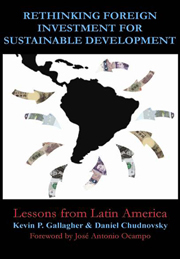Book contents
- Frontmatter
- Contents
- List of Figures
- List of Tables
- Foreword
- Acknowledgements
- Author Biographies
- Rethinking Foreign Investment for Sustainable Development
- 1 FDI and Sustainable Development in the Americas
- 2 Is Foreign Investment Always Good for Development?
- Part 1 Country Assessments
- Part 2 Political Economy of Natural Resources and The Environment
- 7 Investment Rules and Sustainable Development: Preliminary Lessons from the Uruguayan Pulp Mills Case
- 8 Foreigners in the Forests: Saviors or Invaders?
- 9 Bucking the Trend: The Political Economy of Natural Resources in Three Andean Countries
- 10 Beyond Pollution Haloes: The Environmental Effects of FDI in The Pulp and Paper and Petrochemicals Sectors in Brazil
- 11 Missing Links, Dashed Hopes: FDI Spillovers and Sustainable Industrial Development in Mexico's Silicon Valley
- Notes
- References
- Index
10 - Beyond Pollution Haloes: The Environmental Effects of FDI in The Pulp and Paper and Petrochemicals Sectors in Brazil
from Part 2 - Political Economy of Natural Resources and The Environment
Published online by Cambridge University Press: 05 March 2012
- Frontmatter
- Contents
- List of Figures
- List of Tables
- Foreword
- Acknowledgements
- Author Biographies
- Rethinking Foreign Investment for Sustainable Development
- 1 FDI and Sustainable Development in the Americas
- 2 Is Foreign Investment Always Good for Development?
- Part 1 Country Assessments
- Part 2 Political Economy of Natural Resources and The Environment
- 7 Investment Rules and Sustainable Development: Preliminary Lessons from the Uruguayan Pulp Mills Case
- 8 Foreigners in the Forests: Saviors or Invaders?
- 9 Bucking the Trend: The Political Economy of Natural Resources in Three Andean Countries
- 10 Beyond Pollution Haloes: The Environmental Effects of FDI in The Pulp and Paper and Petrochemicals Sectors in Brazil
- 11 Missing Links, Dashed Hopes: FDI Spillovers and Sustainable Industrial Development in Mexico's Silicon Valley
- Notes
- References
- Index
Summary
Abstract
Among the most environmentally sensitive sectors are pulp-and-paper and petrochemicals. In a historical perspective, FDI played an important role in the establishment of the petrochemicals industry in Brazil in the 1970's, when it was driven by strategic state policies to develop the domestic intermediate goods industry. In the pulp-and-paper sector, FDI became prominent just after the year 2000, and it has been exclusively driven by market forces. This chapter presents a comparative analysis of the environmental issues related to FDI in these two sectors in Brazil and extensively focuses on the importance of the international context in fostering domestic environmental commitments. One conclusion is that, in general, domestic firms in these sectors are just as environmentally friendly as foreign firms. What would explain such convergence? First, the stringency of the domestic environmental regulations has pushed for higher environmental standards in both sectors; second, and specifically in the case of the pulp-and-paper sector, international market environmental requirements also contributed to this trend. Last, but not least, the technological competencies accumulated by the domestic firms in both sectors, which are closely related to the strategic state industrial policies applied to them, strengthened their capability to enter into an environmental-technological path. One policy lesson drawn from these case studies is that attracting FDI is not a guarantee of a higher level of sectoral environmental control, while an integrated policy approach to environmental, technological and industry capacity to enhance national environmental control at the industry level is highly recommended.
- Type
- Chapter
- Information
- Rethinking Foreign Investment for Sustainable DevelopmentLessons from Latin America, pp. 201 - 216Publisher: Anthem PressPrint publication year: 2009
- 1
- Cited by



